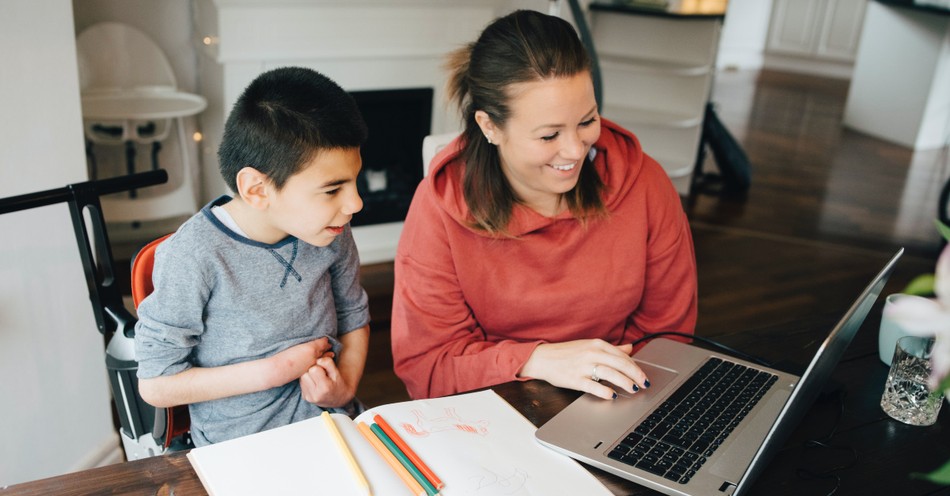The COVID-19 pandemic has given rise to all kinds of “I’m trapped at home with my kids and I’m going out of my mind!” memes, and more than a few articles that would fall into the “first world problems” category. I’m not saying there aren’t challenges, of course. As one of the more helpful memes puts it, with a wistful Forrest Gump looking into space, “And just like that, no one ever asked again what a stay-at-home mom does all day.”
One group of parents we should especially keep in mind at this time is the group least likely to constantly remind us what they are going through, if for no other reason than they’re simply too busy. I’m talking of parents of children with autism and other developmental disabilities. With most, if not all, special education programs and services suspended indefinitely, these parents are even busier than usual.
Many of us haven’t fully thought through what makes “special education,” well, so “special.” The goal of special education is to “help individuals with special needs achieve a higher level of personal self-sufficiency and success in school and in their community…” While that includes academic subjects, those with developmental disorders need to learn essential skills that other children can often learn by imitating parents and their peers, including basic social skills.
Consider something as simple as looking at someone when they speak to you. There is a kind of self-awareness and the ability to acknowledge another’s presence taken for granted in this basic social habit. And, this habit is an essential part of so many other skills that can dramatically impact and even improve one’s social life. A colleague of mine has a son with autism, and he marvels at how his son went from ignoring other people, to greeting them and even sticking out his hand expecting a handshake.
Another incredibly helpful skill to learn is how to cope with the sensory overload. This defining aspect of autism is why so many children on the spectrum tend to be anxious and retreat into distinct behaviors, such as rocking and flicking their fingers. Simply put, they are trying to turn the world’s volume down.
Though parents are, of course, essential to helping their children learn these skills, it often takes special training to learn how to teach these skills to those with unique challenges. So many parents rely on the sorts of programs that have not been available since the start of this pandemic. Even more, such programs provide consistency to those who often feel much safer with a routine.
Children with Down Syndrome present different kinds of challenges, which also require the training and expertise of others that many parents rely on. In addition to losing these services, studies indicate that “respiratory tract infections (viral and bacterial) do appear to be more common in most young people with Down’s Syndrome.” Imagine the anxiety and stress being felt by parents of these kids in the age of COVID-19.
Finally, there’s the fact that, for many parents, the time their kids spend at school offers a necessary respite from an extraordinarily stressful and difficult life. Though they love and serve their children, they’ve lost some necessary down time because of this pandemic.
So, what can we do to help? First, we can pray for these families. Keep in mind that not only are they carrying a heavy load, but right now they offer a powerful and unique witness about the sanctity and dignity of all human life. Their witness is especially important now, at this time, in a culture where so many are left out of the categories of human dignity. All over the world, people with Down Syndrome are highly targeted in utero for elimination through selective abortion. And, of course, if a genetic test to determine autism existed, or a number of other conditions, these children would be under increased threat as well.
Second, we can ask the parents we know in these situations how we can help them. Something as simple as running errands or grocery shopping for them can make a huge difference, since getting out of the house is even more difficult for them than the rest of us.
And, don’t underestimate the power of simply calling and asking a parent how they are doing. One of the most challenging parts of being the parent of a child with special needs, as I am told, is how very isolating it can be. There isn’t much time or energy, much less opportunity, for a social life. I have it from a few very good sources that they would appreciate you just letting them know that you are thinking about them.
As I said, most of these parents aren’t going to spend the limited time and energy they do have to tell us what they’re going through. So, it’s up to us to let them and others know that their tremendous and heroic efforts aren’t going unnoticed.
Publication date: April 27, 2020
Photo courtesy: ©Getty Images/Maskot
The views expressed in this commentary do not necessarily reflect those of CrosswalkHeadlines.
BreakPoint is a program of the Colson Center for Christian Worldview. BreakPoint commentaries offer incisive content people can't find anywhere else; content that cuts through the fog of relativism and the news cycle with truth and compassion. Founded by Chuck Colson (1931 – 2012) in 1991 as a daily radio broadcast, BreakPoint provides a Christian perspective on today's news and trends. Today, you can get it in written and a variety of audio formats: on the web, the radio, or your favorite podcast app on the go.




